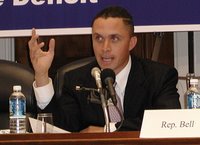 Congressman Harold Ford today announced his support for a package of institutional reforms in the House of Representatives that would end many of the practices that resulted in the Jack Abramoff scandal.
Congressman Harold Ford today announced his support for a package of institutional reforms in the House of Representatives that would end many of the practices that resulted in the Jack Abramoff scandal."We needed to make these changes a long time ago. Jack Abramoff and his corrupt practices have exposed that government, under the leadership of Congress today, is sometimes for sale. This common sense package of reforms should shine more light on our practices and help clean up the process," Rep. Ford said.
The House Rules Reform Package includes the following provisions:
Limits Lobbyist Influence: Limits the influence of lobbyists by requiring trip sponsors to declare that lobbyists have not been invited to travel or attend meetings with Members or staff. The trip sponsor cannot conduct lobbying activities on the trip and may not employ a registered lobbyist. The trip may not be financed by a corporation. The provision also prevents former Members of Congress from using their access to the House floor to lobby.
Increases Fiscal Discipline: Increases fiscal discipline by prohibiting any budget bills from being considered by the House if it increases the federal budget deficit.
Curbs Abuses of Power: Prohibits Members of Congress from conditioning the funding of earmarks on another Member's vote on legislation.
Ends 2-day Work Weeks: Ends the current practice of two-day work weeks by calling Members to the floor for votes or debates four or five days a week.
Know What the House Is Voting on: Prohibits the House from considering legislation unless it has been available to all Members of the House for at least 24 hours of consideration and review.
Limits House Votes to 20 Minutes: No recorded votes in the House of Representatives can last longer than 20 minutes without the consent of either both floor managers or both leaders.
Rep. Ford is also an original cosponsor of H.R. 2412, the Special Interest Lobbying and Ethics Accountability Act, which increases disclosure requirements by requiring electronic disclosure of lobbying reports. It slows the revolving door between government and lobbying by extending the waiting period for Members and certain staff to lobby after their departure from government from one year to two years. It also requires Members to disclose conflicts of interest when negotiating future employment, and bans Members of Congress from threatening official action against trade and corporate groups that do or do not hire members of particular political parties.
Update: I am proud to see Harold Ford Jr. once again willing to take the lead in reforming our government in an effort to make it better for the people of Tennessee and our nation.
His actions are ones worthy of a U.S. Senator.

